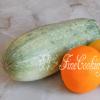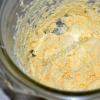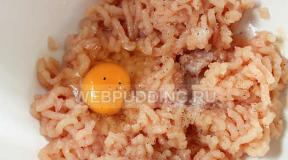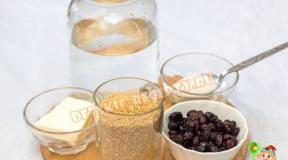Recipes for pickled plums. Pickled plums How to cook pickled prunes
To prepare the recipe we need:
— Plum (the “Hungarian” plum variety is best suited for this recipe) — 50 kg,
— Water -0.8 liters,
– Sugar – 1 kg.,
– Salt – 400 – 500 grams,
– Malt – 500 grams,
— Mustard powder – 50-70 grams.
— Fragrant herbs (mint, black currant, cherry leaves, you can also add oregano, celery or parsnip)
How to make pickled plums - step by step.
First, let's prepare the container. Pickled plums in an oak barrel will, of course, taste better, but if you don’t have one, you can get by with any other container for soaking. Any large ceramic, glass, or enamel bowl is suitable for this recipe (not aluminum, to avoid oxidation).
The plums you plan to use for this recipe must be carefully selected. Rotten, damaged and burst fruits must be mercilessly discarded.
Then, wash the sorted plums thoroughly under running water.
Place the plum fruits in a container for soaking, sprinkling them with fragrant herbs to your liking.
Then, you can prepare the marinade filling itself. Pour water into a separate pan, dissolve the sugar in it according to the recipe.
Then, also dissolve the salt, malt and dry mustard.
This mixture must be boiled until the ingredients are completely dissolved.
Pour the resulting hot mixture over the plums.
And now I’ll tell you a few of my little secrets. If you don’t have malt, you can easily replace it with rye flour. And instead of sugar, I often add honey. True, I increase its amount by 40%, because the sugar content of honey is lower than that of sugar. But honey will give the finished plums a very interesting and pleasant honey taste and aroma.
After the solution has already been poured into the barrel with plums, you need to put a cotton napkin on top, and put a circle (made of wood or plastic) and pressure on it. With correct pressure applied, about 4 centimeters of brine should protrude above the circle.
So, plums need to be kept for 6-8 days at an air temperature of 18-20°C. This is necessary for the fermentation process to start. Then, the barrel needs to be taken out to a cold place. After a month, the plums can be eaten.

I think that if you prepare soaked plums according to this old recipe, then in winter, when you open the barrel, you will not regret the effort. After all, they can be eaten as an independent dish, or they can be added to various salads. The brine turns out so tasty that you can drink it instead of compote or kvass.
Plum is one of our gardeners' favorite trees. It is unpretentious, productive, adapts well to cool climates, and produces tasty, aromatic fruits. Plums are used to make a lot of homemade preparations for the winter: jam, compotes, marshmallows, wine and even hot sauces. But today I want to remind you of one of the forgotten ways to prepare plums for the winter - pickling.
Pickled or, as they are also called, pickled plums are dense and aromatic. Their preparation is not particularly difficult. In winter, such plums are great as a snack, and the brine can be consumed as a drink. I offer the simplest options for preparing pickled plums, as they say, in a hurry.
Read also: 7 ways to make delicious plum jam.
From the article you will learn:
Pickled plums: the simplest recipe
Ingredients:

For preparation, select dense, ripe plums of late varieties, for example, the “Hungarian” variety. Rinse thoroughly and dry on a towel. Afterwards, place the plums in a previously prepared clean deep pan or plastic bucket. Our ancestors fermented plums in oak barrels, if you have one, use it. The result in this case should be even better.
While the plums are drying, prepare the brine. We dilute salt and sugar in 5 liters of water, put it on the stove, bring to a boil, then let it cool. Pour the prepared plums with cooled brine, cover them with a currant leaf, top with clean gauze and leave for fermentation for a week.
Read also: How to quickly ferment cabbage at home.
After a week, that is, when the fermentation process is already in full swing, we check the plums. If necessary, add a little water, cover with a lid and put it in the cellar. The plums will be ready in about a month, and can be stored for up to six months.
Pickled plums: a recipe for cooking with spices
Preparing pickled plums according to this recipe is in many ways similar to the previous one. There is only a slight difference in the ingredients. So, we will need:
- plums - 10 kg;
- Water - 5 liters;
- sugar - 250 g;
- table salt - 75 grams;
- bay leaf - 50 grams;
- mustard - 25 grams;
- currant or cherry leaves for covering plums.
 Place a pot of water on the stove and bring to a boil. Add sugar, salt, mustard and bay leaf. Mix everything, remove from heat and cool. Pour the cooled brine over the prepared plums. Plums for fermentation are prepared in the same way as in the previous recipe.
Place a pot of water on the stove and bring to a boil. Add sugar, salt, mustard and bay leaf. Mix everything, remove from heat and cool. Pour the cooled brine over the prepared plums. Plums for fermentation are prepared in the same way as in the previous recipe.
Preparation of moonshine and alcohol for personal use
absolutely legal!
After the collapse of the USSR, the new government stopped the fight against moonshine. Criminal liability and fines were abolished, and the article banning the production of alcohol-containing products at home was removed from the Criminal Code of the Russian Federation. To this day, there is not a single law that prohibits you and me from engaging in our favorite hobby - preparing alcohol at home. This is evidenced by the Federal Law of July 8, 1999 No. 143-FZ “On the administrative liability of legal entities (organizations) and individual entrepreneurs for offenses in the field of production and circulation of ethyl alcohol, alcoholic and alcohol-containing products” (Collected Legislation of the Russian Federation, 1999, No. 28 , Art. 3476).
Extract from the Federal Law of the Russian Federation:
“The effect of this Federal Law does not apply to the activities of citizens (individuals) producing products containing ethyl alcohol for purposes other than sale.”
Moonshining in other countries:
In Kazakhstan in accordance with the Code of the Republic of Kazakhstan on Administrative Offenses dated January 30, 2001 N 155, the following liability is provided. Thus, according to Article 335 “Manufacture and sale of home-made alcoholic beverages”, illegal production of moonshine, chacha, mulberry vodka, mash and other alcoholic beverages for the purpose of sale, as well as the sale of these alcoholic beverages, entails a fine in the amount of thirty monthly calculation indices with confiscation of alcoholic beverages , apparatus, raw materials and equipment for their manufacture, as well as money and other valuables received from their sale. However, the law does not prohibit the preparation of alcohol for personal use.
In Ukraine and Belarus things are different. Articles No. 176 and No. 177 of the Code of Ukraine on Administrative Offenses provide for the imposition of fines in the amount of three to ten tax-free minimum wages for the production and storage of moonshine without the purpose of sale, for the storage of devices* for its production without the purpose of sale.
Article 12.43 repeats this information almost word for word. “Production or acquisition of strong alcoholic beverages (moonshine), semi-finished products for their production (mash), storage of apparatus for their production” in the Code of the Republic of Belarus on Administrative Offenses. Clause No. 1 states: “The production by individuals of strong alcoholic drinks (moonshine), semi-finished products for their production (mash), as well as the storage of devices* used for their production, will entail a warning or a fine of up to five basic units with confiscation of the specified drinks, semi-finished products and devices."
*You can still purchase moonshine stills for home use, since their second purpose is to distill water and obtain components for natural cosmetics and perfumes.
While every person has tried soaked apples at least once in their life, few have heard of other fruits prepared in a similar way. However, pickled plums are an original snack with a spicy, sweet and sour taste. For soaking, unripe fruits with dense flesh are selected.
Pickled plums in malt
Ingredients:
- 10 kg of dense plums;
- 150 g salt without additives;
- 250 g granulated sugar;
- 100 g of malt (use rye or barley flour);
- 150 g of rye or wheat straw;
- 5 liters of water.
Preparation:
First of all, heat the water to a boil, dissolve sugar in it, then salt. The resulting brine is poured over the straw and left to infuse for a while. Then the resulting brine is filtered and the liquid is poured into the plums, placed in jars. The fruits are thoroughly washed before pouring. Jars with soaked plums are covered with lids and stored in the cold for several weeks.
The readiness of pickled plums is determined by the following signs: the pulp of the plums becomes soft and sweet and sour, the brine changes color to pink, and acquires a characteristic aroma and taste.
Pickled plums with mustard
Ingredients:
- 6 kg of good quality plums;
- 3.6 liters of boiled water;
- 10 spoons of mustard powder;
- 1.4 kg granulated sugar;
- 210 g salt;
- 1 liter of vinegar (mass fraction of acid 6%).
Procedure:
The washed plums are placed in 3-liter jars, placing them tightly. Add a few tablespoons of mustard powder to each jar.
Pour water into the pan, add salt and sugar. The resulting marinade is heated to a boil, after which vinegar is poured in. Remove the marinade from the heat and pour it into jars with plums.
The plastic lids that will cover the soaked plums are doused with boiling water. All that remains is to cover the soaked plums with lids and put them in a cold room where there is no daylight for several weeks. The plums turn out to be very tasty, and the mustard gives a slight spiciness, muting the sweetness of the plum pulp.
Pickled plums in sugar
Of all the recipes for plums in sugar, this is the classic and easiest preparation.
Ingredients:
- 5 liters of water;
- 9-10 kg of dense plums;
- 75 g salt;
- half a glass of sugar.
Technology for preparing pickled plums:
This recipe is no different from previous options. Plums for urination are selected that are dense and unripe. They are washed, removing debris and stalks. Next, the plums are placed in glass jars.
The next step is preparing the brine for pouring the plums. Pour water into a saucepan, dissolve sugar and salt, and heat the liquid to a boil. When the brine has cooled, it is poured into jars with plums. All that remains is to tightly close the containers with clean lids. Pickled plums are refrigerated for a couple of weeks.
The plum tree is a very popular tree among Russian summer residents, although Northern Iran is considered its homeland, the weather conditions of which bear little resemblance to the climate of central Russia. Plum fruits have an excellent and very unusual taste, unlike anything else, and they also have remarkable medicinal properties.
With all this, plums have only one significant drawback - even despite the fact that different varieties have different periods of fruit ripening, they can only be consumed fresh from June to October.
Therefore, summer residents who grow plums in large quantities on their plots have to resort to various methods of processing them: drying prunes, making compote, jam, putting freshly squeezed juice into jars and making all kinds of liqueurs. If you are faced with a similar problem, then we want to tell you how to prepare pickled plums - a recipe for pickled plums.
Pickled plums taste sweet and sour. They can be used as an independent snack and as an ingredient for preparing a salad, as well as a side dish for meat and game.
In principle, any varieties of plums can be used for urination, but late varieties, such as “Winter”, are best suited for this task; they withstand urination very well and at the same time acquire the wonderful taste of plum varieties called “Hungarian”, especially such varieties as like Hungarian Azhan, Italian or ordinary.
A prerequisite for successful wetting of plums is their preliminary sorting. Firstly, from the harvested crop you need to select fruits that can be called slightly unripe, literally for a couple of days, so that they are hard, but at the same time have already gained color and taste. Secondly, special attention should be paid to their condition. Plums with mechanical damage and traces of insect pests must be removed.
There are no trifles in the matter of urinating plums; even the correct selection of dishes in which to urinate the fruits is of great importance for the success of the plan. Of course, small (20 liter) oak tubs, which were originally used in traditional recipes, are best suited for this.
But if in the old days there were no problems with such containers, then in Nadi the days of owners of such treasures can be counted on one hand. The rest have to look for alternative ways and use enamel buckets, large metal pans for soaking, or you can soak plums in ordinary three-liter glass jars.
The technology for soaking plums is extremely simple: the fruits are tightly packed into prepared containers and filled with brine. The entire existing variety of recipes for pickled plums is based precisely on the use of various brines prepared according to different recipes.

Each housewife has her own, special one, which is why pickled plums, prepared seemingly in exactly the same way, have completely different tastes. Here are just a few brine recipes for soaked plums (all ratios are based on 10 kg of plums and 5 liters of water):
1. Regular brine: 150 g granulated sugar, 75 g salt;
2. Honey brine: 400 g honey and 75 g salt;
3. Malt brine: 250 g of granulated sugar, 150 g of salt, 100 g of malt, after all this is dissolved in water, 150 g of rye or wheat straw is poured with it.
4. Brine with mustard: 250 g granulated sugar, 75 g salt, 12 teaspoons dry mustard and 50 g bay leaves;
After the plums are filled with brine, you need to cover them with a wooden circle, on top of which you place pressure. If you used three-liter jars, then you can use a cross made of twigs, which is inserted under the neck of the jar.
Immediately after pouring, the plums should be kept in a warm place for 2-3 days so that the fermentation process takes place more actively. Then it needs to be taken out into the cold.
Plums soaked in this way are ready within 20-30 days, after which they need to be stored in the refrigerator for 4 to 5 months. By the way, the brine is also suitable for consumption, as it has a delicate pink color and an unusual sweet and sour taste, and the presence of a small amount of gases in it makes it an excellent drink that perfectly quenches thirst.



















